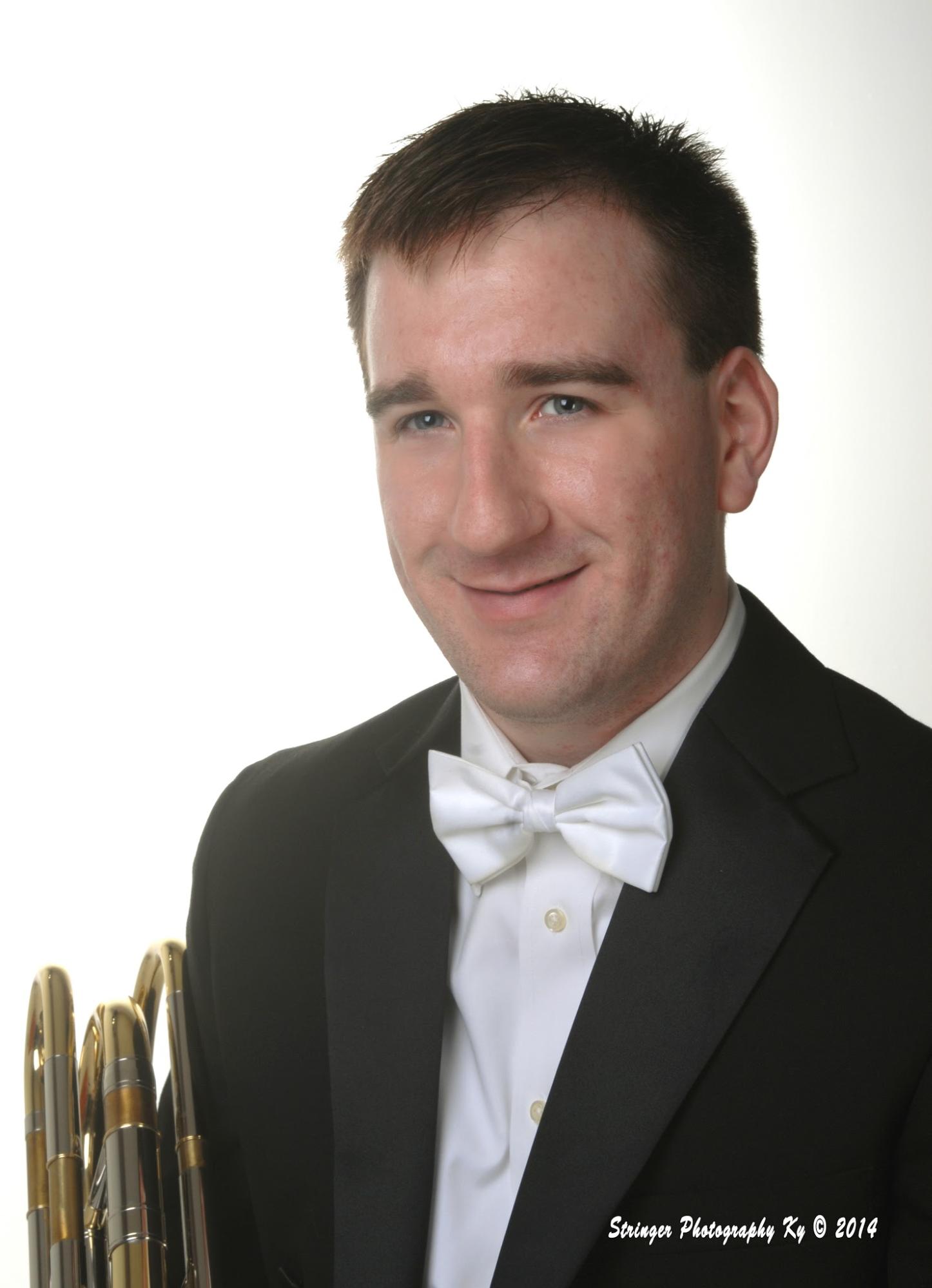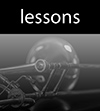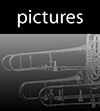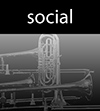Adam Rainey
Adam Rainey, a Kentucky native, joined the Kansas City Symphony as bass trombonist at the beginning of the 2014-15 season. In 2012, Adam made his debut with the Boston Symphony Orchestra playing Mendelssohn's A Midsummer Night's Dream under the baton of Bernard Haitink. Later that year he recorded John Williams' Fanfare for Fenway with the Boston Pops under the baton of Williams in celebration of the first centennial of Fenway Park. He has also performed with the Louisiana Philharmonic, Philadelphia Orchestra and Vermont Symphony. Attendance at summer festivals has included the Pacific Music Festival (Japan), and two summers as a fellow at the Tanglewood Music Center. Adam received both his Bachelor's and Master's of Music degrees from the New England Conservatory of Music, under the instruction of Douglas Yeo and James Markey. Additionally, he has studied with Norman Bolter, Mark Gaal, Steve Lange, Peter Norton and Toby Oft. Adam received 2nd prize at the 2011 Zellmer-Minnesota Orchestra Trombone Competition and was a finalist at the International Trombone Association's Edward Kleinhammer Competition.
PRELUDE
As a suggestion, if you haven't read Doug Rosenthal's "A Tale of Two Auditions," do it now. It is a fantastic article about his audition preparation for the Utah Symphony and the Washington National Opera/Kennedy Center Opera House Orchestra. I learned many things from his article when I took my auditions. Secondly, my preparation for auditions is not gospel. It worked for me but everyone is different and we must understand our unique personal tendencies. What is common amongst us is that hard work and determination are key components that lead to success, failure should not be feared, and every unsuccessful audition is a learning opportunity!
Kansas City was not my first audition. I began earlier with the Rochester Philharmonic 1-year position where I advanced to the semi-finals and was later cut. I was very excited to have advanced! Next came Boston Symphony (Tape advanced only), Utah Symphony (semis), Philadelphia Sub list (success), Charlotte Symphony (semis) and Atlanta Symphony (cut from prelims). Even though I didn't win these auditions, I considered any advance as a small victory. However, one major thing started to annoy me. Why couldn't I get out of semis? What do the other people have that I don't? It then dawned on me, the one thing we so often forget: I didn't have a strong foundation in my basic skills.
AUDITION PREPARATION
Douglas Yeo
My first teacher at New England Conservatory, Douglas Yeo, taught me everything he knew about the audition process. The two biggest things that I remember him saying were: 1. When you are preparing, be sure to practice everything that other bass trombonists are going to have problems with, and 2: After your first audition (which was for experience), you go with the purpose and mindset of winning the job.
One of the things that I admired most about Mr. Yeo (and still do) was his diligence. He always worked on the basics. His Kopprasch etudes were stunningly clean and his Bordogni's were musical and well thought-out. He constantly inspired me to be a better musician. Additionally, Mr. Yeo always said that the etudes he assigned me in lessons corresponded to something I would play in orchestra. For example, etudes no. 1 and 5 in Selected Kopprasch Studies for Trombone with F attachment (ed. Fote) work great with Mozart's Kyrie from the Requiem. The etudes make you work on modulating scales, clean articulation and your breath control. Coincidentally, the Kyrie lines up perfectly with these etudes. So how does this relate to you and me? We must keep our basic skills as polished as the excerpts upon which we tend to place all of our focus.
In my daily audition preparation, I always warmed up in the morning and did a practice session both during the day and in the evening. My 'warm up' consisted of many exercises that addressed long tones, short tones, scales, slurs, etc. Many of my exercises came from A "Singing Approach" to the Trombone (And other Brass) by Charles Vernon (Chicago Symphony). I always tried to make my first notes of the day sound as great as possible (even on the mouthpiece). We should practice our tone consistency in our warm up because mornings are sometimes the most difficult time of the day to play. Think of it as adversity training. In a nutshell, our warm-up IS a practice session. It also teaches us how our bodies react to what we did the day before. After a heavy night of practice until 10:30 pm, my chops would often feel like pulled pork. If and when this happened, I would change my warm-up to make my face feel better. I remember Mr. Yeo telling me that the audience does not care if you have a cold, stiff lips, etc. They just want to hear great music. We must learn how to play our best in any situation or under any circumstances.
During my day session, I would practice etudes, scales and basics. This is the bread and butter of trombone playing! I would hit the Arban's book with the focus of building stamina, clean articulation in all registers, and versatility on the horn. To vary things I would play some Blazevich or whatever happened to be lying around my apartment. We should always be sure to approach the entire range of our instrument and variation in all styles of playing. Bass trombonists: practice the Rochut books and play both octaves. (We have to remember the bass trombone is not a tuba.) Yes, the second Rochut book is difficult, but it will help your tone in the lower range if you address the higher (and vice versa). If we only practice low etudes, we start to develop an unfocused sound. This is why bass trombonists sometimes play with unclear articulations and a tone that sounds like a blob. Don't sound like a blob. Practice that higher octave!
My final session of the day would consist of intensive intonation work and the audition repertoire. At the New England Conservatory, the tuba studio would always work on buzzing/playing with a drone for intonation. Well, I took their idea and made my own scale study. All you need is a metronome and a tuner with a loud drone. First, pick a scale and set the metronome to 60 bpm and find the tonic on the drone. For example, the scale is Bb major. The tonic is Bb. Have your drone play middle Bb. With your metronome, play an ascending Bb scale in half notes from the lowest note in your range to the highest. Pay attention to your pitch in comparison to the drone. Yes, there are going to be dissonant intervals. However, this exercise addresses your harmonic intonation. Just make it sound as great as you can. Once you finish with half notes repeat the exercise while playing quarters, eighths and triplets in the same tempo. During this process, turn off the drone and try to listen to yourself play a scale with melodic intonation. I usually record myself with my phone so I can listen afterwards. You will slowly wean yourself off the tuner and develop an internal intonation.
For solos and excerpts, you need to know the pieces you are playing. In the Kansas City audition I had to play the Strauss Horn Concerto No. 1. It is a popular solo amongst horn players which means you can go on YouTube and find a recording of the piece. Radek Baborak was my choice. He played it like a horn player and had the proper musicality. There were so many people at the audition who played the solo like they never heard it before!
The same goes for excerpts. They are just pieces of music taken from a larger composition. If you are supposed to play Mahler's 5th symphony, don't just listen to the one little excerpt over and over again. Listen to the entire piece. Get a score and follow along. If you study, listen and practice the music (Correctly!), the listener will know you understand the music. While many things often seem silent to the performer they are, in actuality, very obvious to the audience or judging committee.
MENTAL COMPONENT
The stress of being in an audition can bring out the worst in us. What do I mean by that? Someone who is critical of themselves could suddenly be more critical. Thoughts of failure could leak into their playing and make everything self-destruct. Someone who is very shy or nervous could break down in an audition due to the stress that they put on themselves. These are very natural reactions of which no one should be ashamed. The only thing you can do is face your issues and learn to handle them as well as possible.
I am fortunate in that I tend to not get very nervous during an audition. Yes, the occasional jitters happen and you feel like you are at the top of a rollercoaster waiting to fall but again that is normal. So how did I deal with my issues? How do we get to the point where nerves are too much of an issue? First, I overcame nervousness by playing for as many people as I could find. When I was in my undergrad at NEC, I always wanted to play in trombone class. Did I get nervous and play like poorly? Yes, at times I did but after doing it over and over again, I began to develop my own ways of overcoming nervousness. Another thing you can do is play for people during your practice session. On the nights I would practice at school, I would take a break from playing to go search the practice rooms and find someone to listen to me. After I played for them, I would always get their comments. It didn't matter if I agreed or disagreed with them. A critique is one's own, not yours. You could take it or leave it but we can learn something from everyone. Another idea is to contact people that you know that play different instruments and make a little mock audition for yourself. Give them the repertoire list, some paper to write comments on and treat it like an audition. When you are finished playing, discuss your audition and buy them dinner or a round of drinks afterward. If you want to overcome your stage fright, you have to face it and adapt.
For being too self critical, I recommend Kenny Werner's Effortless Mastery. My sister, a horn player, gave this book to me for Christmas. She said it helped her overcome many mental things related to performing and every day activities. The book talks about the problems that Mr. Werner had in his musical career and how he overcame it. I gained two things from the book. One: You are Great. I repeat: You Are Great. Two: In the scheme of things, playing an audition isn't a big deal. Go sit outside one afternoon and look around. In this giant universe, does an audition really make a difference? If you don't win an audition, will the sky fall and volcanoes shoot up from the ground? No... But what if I desperately need this job to pay bills and support my family? If you don't win, you can still keep on living and find ways to make a living. So if an audition isn't a big deal, then what is it? An audition is a way to play for others and show them why you love music. It’s that passion of our art that ultimately leads us to win any audition or competition. Without it, we are merely mechanical. You must ask yourself and understand if and why you love what you do.
Kansas City Symphony Hall
THE AUDITION
After all the preparation, I arrived in Kansas City, MO for the audition. I showed up a day early to get settled into my hotel and figure out where I would need to go for the audition. I then spent the remainder of the day just relaxing in my room, watching TV, napping, and playing video games. I would only play my horn a little bit. Fifteen minutes max (Basic warm up). Your chops need to be as fresh as they can for the audition. Maybe take an aspirin the night before as a backup as it helps with pain and swelling.
My preliminary round was in the morning and they put the applicants into groups of five or six. They gave us rooms an hour in advance to warm up and do whatever needed to be done. I warmed up at the hotel with my practice mute. I didn't need to warm up at the hall. Besides, I hate warming up next to other applicants. When you are at the hall, you do not need to practice your excerpts before you play. You can perform a couple of bars to assess how everything is working. If you are practicing Mozart's Requiem before you play on stage, you shouldn't be at the audition. Finally, bring a lot of snacks with you. 75% of the auditions I've been to were behind schedule. You do not want to be hungry before you play. You should also use the restroom and turn your phone off – not silenced. Off!
Preliminary Round Repertoire:
- Berlioz - Hungarian March
- Rossini - La Gazza Ladra
- Schumann - Symphony No. 3
- Mozart - Requiem (Kyrie)
- Wagner - Das Rheingold (Scene 4)
- Strauss - Horn Concerto No. 1 (Exposition)
Semi-Final Round Repertoire:
- Haydn - Creation
- Wagner - Lohengrin
- Respighi - Pines of Rome
- Strauss - Ein Heldenleben
- Wagner - Das Rheingold (Scene 2)
- Strauss - Till Eulenspiegel
- Wagner - Die Walkure
Final Round Repertoire:
- Strauss - Horn Concerto No. 1 (Exposition with Piano)
- Rossini - All excerpts from La Gazza Ladra
- Nielsen - Concerto for Flute
- Mozart - Requiem (Kyrie)
- Kodaly - Hary Janos Suite (Mvt. IV)
- Strauss - Le Bourgeois Gentilhomme
- Verdi - Falstaff (Act III)
- Respighi - Fountains of Rome
- Schumann - Symphony No. 3
- Wagner - Das Rheingold (Scene 4)
- Strauss - Ein Heldenleben
- Haydn - Creation (It wasn't on the finals list they gave us. Always be prepared)
My preliminary audition went alright. I felt I played at about 80% efficiency. However, I thought I played horribly in the semis. My Haydn was awful! I kept my cool after my mess up and put my mistakes behind me. They must have liked something since I advanced. In the finals, I came in very happy. This was my first time in the finals. I just wanted to have fun. I was on FREAKIN’ Cloud-9! Before I played, I had thirty minutes to rehearse with my accompanist. He was a cool guy and I told him that I wanted to make a great performance out of the Strauss concerto. We did just that. One thing that the musicians on my panel noticed was the Strauss concerto. It was exciting, musical and attractive. As for the rest of the round, I just tried to do my best. After all the loud playing in Ein Heldenleben, they asked for the Haydn. I was pretty tired by that point and was a little perturbed at their last minute choice. All I could do was stand tall and try my best. I expectedly cracked some notes but I didn't let it bother me. After a few minutes of waiting, they announced the winner. I had to double check and make sure they said the right number. It was me? It was.
RETROSPECT
Auditions are funny things. Simply, they are trials set up by orchestras to find a new musician. They can be quite fun. You get to play for professionals (Whom you don't see in the beginning because of a big black screen) and it feels like you are in a tournament.
Being head to head with other people that play the same instrument can be exciting. However, it can be taken the wrong way. Students in music schools always talk about how great it would be to win a job in an orchestra. That is a great mind set to have! It's positive and gives you a goal to work towards. You also make new friends by playing excerpts for others. With all those hours of work, you feel unstoppable. When the time comes to take the audition, you get conflicting ideas from yourself. You question all the work and sacrifice. Am I going to win? What if I lose? Do I have what it takes? How am I going to pay my bills/loans without a job? Will my friends think less of me if I return to school a 'loser?' At some point, I have said these things to myself. It is completely natural, but toxic. You can get obsessed with trying to win so badly that you overlook the reason why you pursued music in the first place.
I didn't decide to be a musician because I loved playing auditions. I wanted to be a part of an orchestra and play fantastic music! Memories of listening to Eric Kunzel and the Cincinnati Pops still give me goosebumps. Even when I was little boy I would love listening to The Phantom of the Opera and how the bass trombone would play his/her butt off!
If you don't win an audition after playing brilliantly, think of this analogy:
One person is told to sit at a table and try twelve different types of ice cream and decide which is best. Each flavor is hand-crafted with the finest ingredients. Each bowl before him/her is delicious in its own special way. However, this person doesn't like mint-flavored ice cream because of personal tastes. There goes one flavor. Now change the bowls into twelve applicants for a symphony job. Get the idea?













